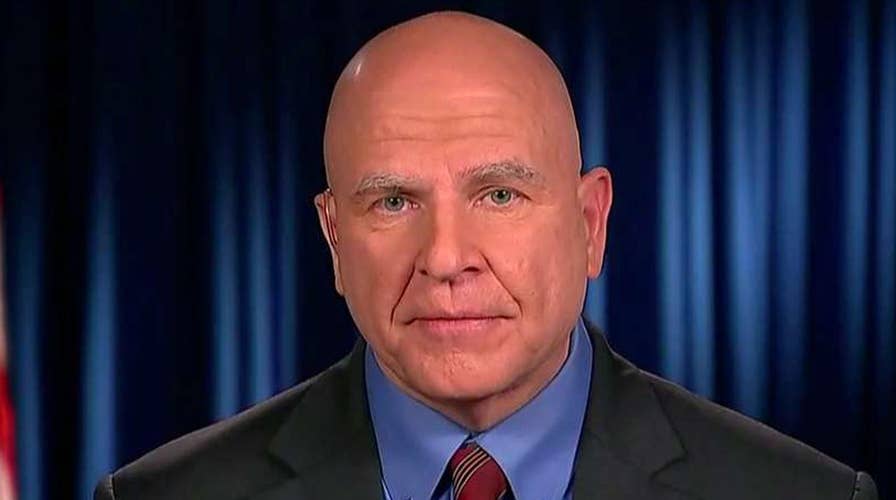Exclusive: General H.R. McMaster on decision to strike Syria
President Trump's national security adviser weighs in on 'Fox News Sunday'
President Trump’s top officials moved Sunday to define the administration’s foreign policy -- saying the Syria air strikes haven't reversed their stances on ISIS and other world issues but made clear the president will “act in the best interest” of Americans against unchecked threats and aggression.
“Our priority in Syria,” Secretary of State Rex Tillerson told CBS’s “Face the Nation.” “That really hasn’t changed.”
Still, Tillerson made clear that the 6-year-long effort to end the regime of Syrian President Bashar Assad hinges on defeating the Islamic State terror group, which has strongholds in Syria and Iraq.
“I think the president has been quite clear. First and foremost, we must defeat ISIS,” Tillerson said in making his first Sunday talk show appearances since becoming the country’s top diplomat.
He spoke several days after Trump ordered missile strikes on a Syrian airbase from which Assad earlier last week apparently launched a chemical attack on civilians living in rebel territory, killing a reported 87 people.
Tillerson also said the United States wants to solve the Syrian crisis through international coalition, after the administration, in the days before the attack, suggested that removing Assad was not a priority.
His comments also come ahead of his trip next week to Assad-ally Russia, where he’ll meet with Russian Foreign Minister Sergey Lavrov and perhaps President Vladimir Putin.
The missile strikes and Tillerson’s remarks Sunday also appear to send a message to any nation operating outside of international norms.
Tillerson didn't specify North Korea, but the context was clear enough.
"If you violate international agreements, if you fail to live up to commitments, if you become a threat to others, at some point a response is likely to be undertaken," he told ABC's "This Week."
There was little doubt the missile strikes would be seen in Pyongyang as a message. The North has long claimed that the U.S. is preparing some kind of assault against it and justifies its nuclear weapons as defensive in nature.
Tillerson was critical of Russia immediately after the U.S. airstrikes Thursday in Syria but made clear Sunday that Russians were not the target.
After last Tuesday's chemical attack in Syria, Trump said his attitude toward Assad "has changed very much." And Tillerson said "steps are underway" to organize a coalition to remove him from power.
But as lawmakers called on Trump to consult with Congress on future military strikes and a longer-term strategy on Syria, U.S. Ambassador to the United Nations Nikki Haley described regime change in Syria as a U.S. priority and inevitable. Meanwhile, Tillerson suggested that the airstrikes hadn't really changed priorities toward ousting Assad.
Pressed to clarify Sunday, National Security Adviser Lt. Gen. H.R. McMaster said the goals of fighting ISIS and ousting Assad were somewhat "simultaneous" and that the objective of the missile strikes were to send a "strong political message.”
"We are prepared to do more," McMaster said on “Fox News Sunday.” "The president will make whatever decision he thinks is in the best interest of the American people."
McMaster also made clear that Trump wants a world-wide response to Assad’s action that would include Russia and Iran.
A top Senate Democrat and Republican differed Sunday on Trump having used executive powers to attack the Syrian government but agreed that Congress must be included in further actions.
Texas Sen. John Cornyn, the Senate’s No. 2 Republican and a member of the chamber’s Intelligence committee, told “Fox News Sunday” that Trump needs to come to Congress before committing troops.
“It is required,” he said. “It also makes good sense before we commit our military and our men and women in uniform to any sort of conflict. They deserve the support of Congress on a bipartisan basis.”
Trump sent a letter Sunday to Congress that explained why he acted, the details of the attack, asserted his constitutional authority to act and affirmed his efforts to “keep Congress informed.”
Maryland Sen. Ben Cardin, the top Democrat on the Foreign Relations Committee, told Fox on Sunday that no congressional authority exists for going against Assad, so there is no authority to use force.
“The president has some inherent (constitutional) power,” Cardin said. “But as he consulted with us by notice on this attack, it's incumbent upon him to consult with Congress. And if there is going to be use of force in a continuing basis, he needs the authorization of Congress.”
Reluctant to put significant troops on the ground in Syria, the U.S. for years has struggled to prevent Assad from strengthening his hold on power.
Sen. Lindsey Graham on Sunday called for as many as 6,000 more U.S. troops to fight the Islamic State.
The South Carolina Republican told NBC’s "Meet the Press" that the additional troops would "attract more regional fighters to destroy" the militants. But he didn’t say where the Americans should be sent.
The Associated Press contributed to this report.





